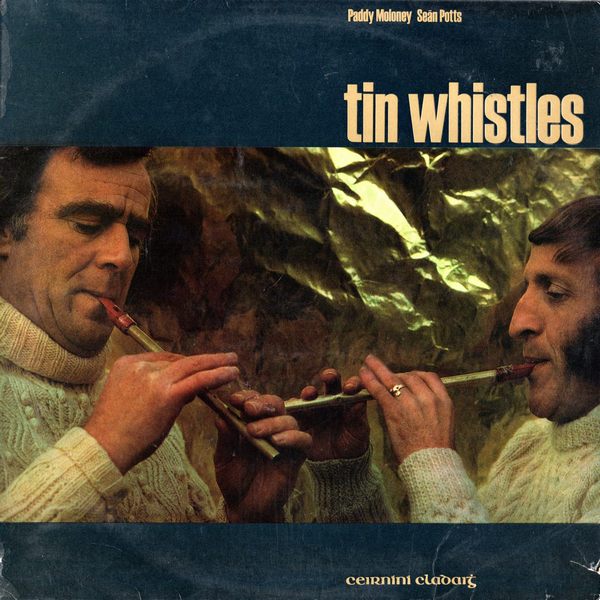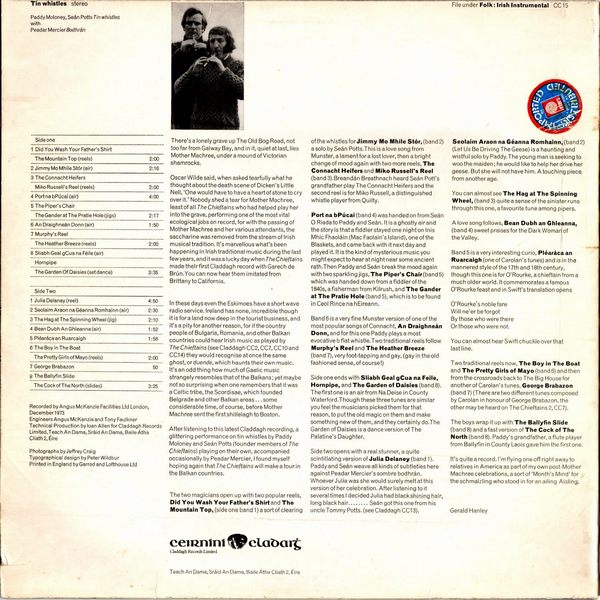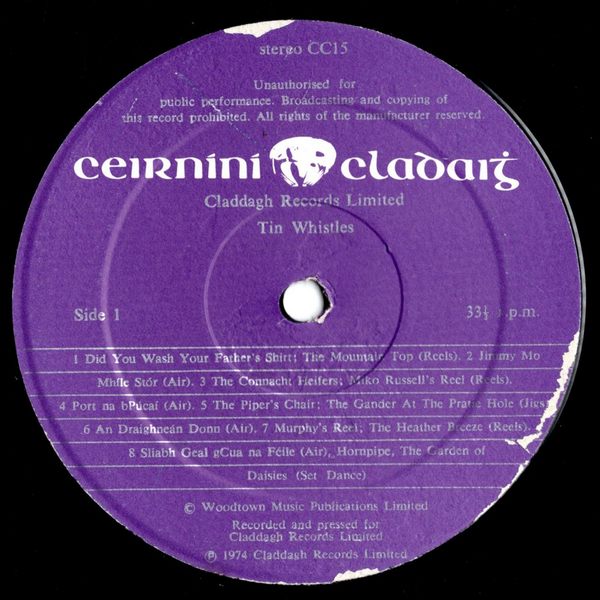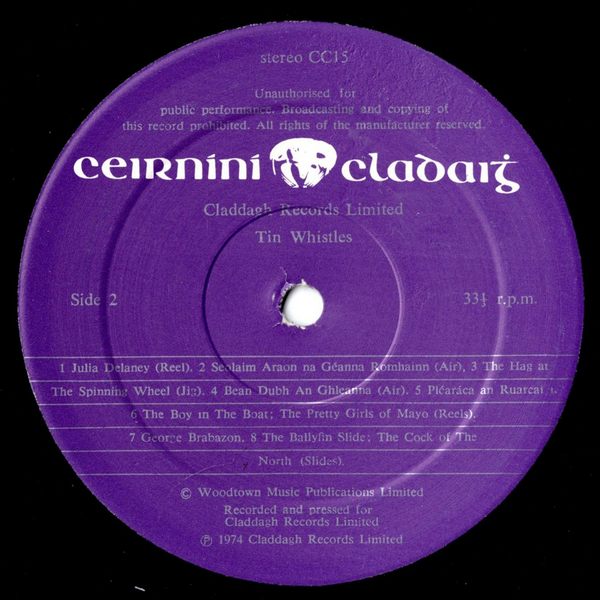
 |


 |
Sleeve Notes
There's a lonely grave up The Old Bog Road, not too far from Galway Bay, and in it, quiet at last, lies Mother Machree, under a mound of Victorian shamrocks.
Oscar Wilde said, when asked tearfully what he thought about the death scene of Dicken's Little Nell, 'One would have to have a heart of stone to cry over it.' Nobody shed a tear for Mother Machree, least of all The Chieftains who had helped play her into the grave, performing one of the most vital ecological jobs on record, for with the passing of Mother Machree and her various attendants, the saccharine was removed from the stream of Irish musical tradition. It's marvellous what's been happening in Irish traditional music during the last few years, and it was a lucky day when The Chieftains made their first Claddagh record with Garech de Brún. You can now hear them imitated from Brittany to California.
In these days even the Eskimoes have a short wave radioservice. Ireland has none, incredible though it is for a land now deep in the tourist business, and it's a pity for another reason, for if the country people of Bulgaria, Romania, and other Balkan countries could hear Irish music as played by The Chieftains (see Claddagh CC2, CC7, CC10 and CC14) they would recognise at once the same ghost, or duende, which haunts their own music.
It's an odd thing how much of Gaelic music strangely resembles that of the Balkans; yet maybe not so surprising when one remembers that it was a Celtic tribe, the Scordisae, which founded Belgrade and other Balkan areas … some considerable time, of course, before Mother Machree sent the first shillelagh to Boston.
After listening to this latest Claddagh recording, a glittering performance onTin Whistles by Paddy Moloney and Seán Potts (founder members of The Chieftains) playing on their own, accompanied occasionally by Peadar Mercier, I found myself hoping again that The Chieftains will make a tour in the Balkan countries.
The two magicians open up with two popular reels, Did You Wash Your Father's Shirt and The Mountain Top, (side one band 1) a sort of clearing of the whistles for Jimmy Mo Mhile Stór, (band2) a solo by Seán Potts. This is a love song from Munster, a lament for a lost lover, then a bright change of mood again with two more reels, The Connacht Heifers and Miko Russell's Reel (band 3). Breandán Breathnach heard Seán Pott's grandfather play The Connacht Heifers and the second reel is for Miko Russell, a distinguished whistle player from Quilty.
Port na bPúcaí (band4) was handed on from Seán O Riada to Paddy and Seán. It is a ghostly air and the story is that a fiddler stayed one night on Inis Mhic Fhaoláin (Mac Faolain's Island), one of the Blaskets, and came back with it next day and played it. It is the kind of mysterious music you might expect to hear at night near some ancient rath. Then Paddy and Seán break the mood again with two sparkling jigs, The Piper's Chair (band5) which was handed down from a fiddler of the 1840s, a fisherman from Kilrush, and The Gander at The Pratie Hole (band 5), which is to be found in Ceol Rince na hEireann.
Band 6 is a very fine Munster version of one of the most popular songs of Connacht, An Draighneán Donn, and for this one Paddy plays a most evocative b flat whistle. Two traditional reels follow Murphy's Reel and The Heather Breeze (band 7), very foot-tapping and gay, (gay in the old fashioned sense, of course!)
Side one ends with Sliabh Geal gCua na Feile, Hornpipe, and The Garden of Daisies (band 8). The first one is an air from Na Deise in County Waterford. Though these three tunes are similar you feel the musicians picked them for that reason, to put the old magic on them and make something new of them, and they certainly do. The Garden of Daisies is a dance version of The Palatine's Daughter.
Side two opens with a real stunner, a quite scintillating version of Julia Delaney (band 1). Paddy and Seán weave all kinds of subtleties here against Peadar Mercier's sombre bodhrán. Whoever Julia was she would surely melt at this version of her celebration. After listening to it several times I decided Julia had black shining hair, long black hair Seán got this one from his uncle Tommy Potts, (see Claddagh CC13).
Seolaim Araon na Géanna Romhainn, (band 2) (Let Us Be Driving The Geese) is a haunting and wistful solo by Paddy. The young man is seeking to woo the maiden; he would like to help her drive her geese. But she will not have him. A touching piece, from another age.
You can almost see The Hag at The Spinning Wheel, (band 3) quite a sense of the sinister runs through this one, a favourite tune among pipers.
A love song follows, Bean Dubh an Ghleanna, (band 4) sweet praises for the Dark Woman of the Valley.
Band 5 is a very interesting curio, Pléaráca an Ruarcaigh (one of Carolan's tunes) and is in the mannered style of the 17th and 18th century, though this one is for O'Rourke, a chieftain from a much older world. It commemorates a famous O'Rourke feast and in Swift's translation opens
O'Rourke's noble fare
Will ne'er be forgot
By those who were there
Or those who were not.
You can almost hear Swift chuckle over that last line.
Two traditional reels now, The Boy in The Boat and The Pretty Girls of Mayo (band 6) and then from the crossroads back to The Big House for another of Carolan's tunes, George Brabazon (band 7) (There are two different tunes composed by Carolan in honour of George Brabazon, the other may be heard on The Chieftains 2, CC7).
The boys wrap it up with The Ballyfin Slide (band 8) and a fast version of The Cock of The North (band 8). Paddy's grandfather, a flute player from Ballyfin in County Laois gave him the first one.
It's quite a record. I'm flying one off right away to relatives in America as part of my own post-Mother Machree celebrations, a sort of 'Month's Mind' for the schmalzling who stood in for an ailing Aisling.
Gerald Hanley